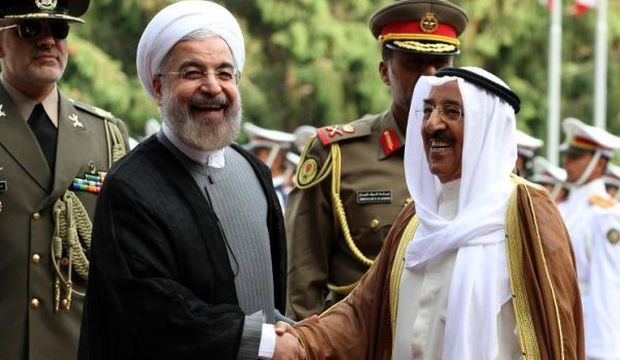Following its nuclear deal with world powers, Iran announced it was seeking “dialogue” with its neighbors in order to “achieve a joint and reciprocal understanding regarding regional crises, and to achieve peace, security, and stability” in the Middle East. Despite these sentiments, Iran set a date for September to begin this “dialogue,” and yet the Gulf states were the last to know about it. Needless to say, these plans were declared in haste, in light of the lack of a suitable background for such talks and Iran’s increasingly belligerent actions in the region. Despite this, and Iran’s recent inflammatory rhetoric—especially towards Saudi Arabia following the recent Hajj stampede—there are renewed calls for such talks to take place. The latest of these came from Kuwait’s foreign minister, who said recently that his country was “ready to undertake dialogue with Iran, since the countries of the Gulf Cooperation Council [GCC] have always believed that the necessary fundamentals for cooperation with Iran are in place, and we hope to begin this dialogue in order to secure the security and stability of the region.”
This call comes as Tehran’s war of words against Saudi Arabia grows ever more noisy. This is not surprising given that the Kingdom is at the frontline of those who oppose the Iranian regional project. They also come as Iran continues to make threats of force against some of its neighbors, and conducts a brazen politicization of a religious event such as the Hajj, with Iranian President Hassan Rouhani even using a podium such as the UN General Assembly to attack the Kingdom on this issue. In light of this it may seem that any calls for dialogue with Iran coming from Gulf countries such as Kuwait place these countries at loggerheads with fellow GCC member Saudi Arabia. In reality, however, the current tensions only exist between Riyadh and Tehran, and not between any of the GCC member-states or the organization as a whole. If there are any such tensions—and I don’t believe this to be the case—then Gulf states should just declare their true intentions, instead of continuing with this tedious charade of warmth toward Tehran, using the GCC as a cover to conduct rapprochement with Iran in order to avoid embarrassment in front of fellow members. In the end, these countries’ real stances will be seen in their actual bilateral relations with Tehran, as, after all, any country surely has the right to declare its true position on any issue—though of course this comes with the caveat that it should not be playing two sides at the same time.
It is important to realize that not all GCC countries share the same view with respect to Iran. Oman is a case in point, with Muscat sharing what could be described as a special relationship with Tehran. Secret meetings were held in the Omani capital prior to the signing of the nuclear deal—meetings which fellow GCC member-states were not informed about—and Oman, using the excuse of “impartiality,” has not participated in the Saudi-led campaign against the Iran-backed Houthis in Yemen. As for Kuwait, it also has warm ties with Iran, which it is slowly seeking to improve, going it alone without some of its fellow GCC member-states. The same goes for Qatar; we can repeat here Rouhani’s statement that the nuclear deal “will no doubt lead Iran to have better relations with its neighbors, especially Qatar.” Who knows, maybe the coming dangers from Tehran will be directed solely at Saudi Arabia, the UAE, and Bahrain, while the other GCC member-states remain safe.
The GCC was founded in 1981 as part of a vision outlined by the six member-states to safeguard their joint interests and the region’s security. The main driving force for the security concerns was the danger posed by Iran’s ambitions in the region. Today, nearly 35 years after the organization was established, Iran’s efforts to export its 1979 revolution have not waned one bit. In fact we can say that Iran’s efforts here have increased significantly. And instead of the GCC taking a united stance on a foe that openly uses threats of force, the organization now faces an unprecedented lack of clarity regarding its collective position toward Tehran’s destabilizing policies. This effectively flies in the face of the GCC’s founding principles, and leaves its members open to the threat of its original and longtime foe across the eastern bank of the Arabian Gulf. But before we start pointing the finger at Iran for its covert, and now overt, infiltration of the GCC, the organization itself must answer a crucial question: how has it allowed the idea of the Iranian threat to become diminished to such an extent, until that threat has reached the dangerous stage it is at today?
Iran can receive no more precious a gift than these calls for dialogue from Gulf countries, which reach Tehran presented on a golden platter.
